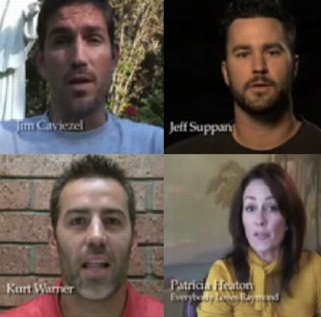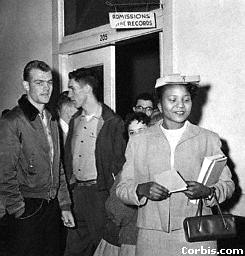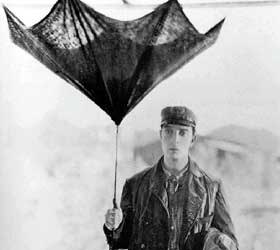Seeing Christopher Dickey's review of Doug Marlette's novel Magic Time reminded me I let last week's little gem from Parker slip away. It wasn't really worthy of attention on its own terms--to my knowledge that's pretty much the same thing as saying "it was a Kathleen Parker column"--but it's an interesting sociological document just the same.
In brief, Marlette's novel concerns a Mississippi-born journalist working in New York during the first Gulf War. When terrorists blow up an art museum he's drawn back into the Mississippi Burning of his youth, when his activist first love was among the four people killed in a church bombing. Parker:
Visiting history through Ransom's eyes, we see the affinity between those who murdered civil rights workers and those who blow up art museums. Or fly airplanes into buildings. Both are fueled by resentment and nihilism; both wrap themselves in a mantle of religion.
Same story, different sheets.
Great line; I wonder if she thought of "Same sheets, different day" first and rejected it as too rude for the delicate digestions at Townhall?
I've now read half a dozen actual reviews of the book and none of them treats the terrorist story as anything more than a catalyst for the main plot, but who knows, maybe Parker is right. Or maybe not:
Marlette is especially riveted by the "Good German phenomenon" -- how good people can avert their gaze from horror. How did decent people look the other way when Goodman, Schwerner and Chaney, young men in their 20s, were savagely beaten and shot to death?
Those questions inevitably lead to others. Forget what Jesus would do. What would Allah do?
I dunno. Whaddya want them to do? They've reportedly been watchin' human idiocy at work for a long time, so they're probably beyond peeing their sheets over it.
This is the lesser of our two sociological themes here, though I'm not sure it's the minor one in the grand scheme of things: the remarkable rewriting of WWII as a cartoon battle of Good Mouse vs. Bad Cat. Fascism is now Stalinism, Chamberlain an animated stick figure who single-handedly capitulated to the Nazi Holocaust, before Sir Winston, Pope Infallible I of the Neocon Church, jumped up to save the day. And we might look back with some nostalgia at the early days of the fiasco of an occupation in Iraq, when the warfloggers invented an entire German resistance movement ("The Werewolves") out of a single murder and some graffiti, in order to explain a few minor glitches in the Bush administration plan. Okay, that last was a bit of overstatement. Strike "plan".
Now as to "Good German". Marlette may indeed be interested in the phenomenon; he may even make use of it in the fictional Delta of the mid-60s. But tell me what alternative history Parker's been smoking? "Good Germans" did not avert their gaze from horror. They were active participants. They danced around the bonfires of "foreign" books. They smashed the shops, burned the Synagogues, and beat Jews to death on Kristallnacht. They heiled their lungs out and bought up the souvenir tee shirts at Fuhrerfest '33. They ratted on relatives, friends and neighbors for thoughtcrime. They drove the trains to the concentration camps. They flocked to the cinema. They sent their children to breeding camps, or into the Hitlerjungen, and when the wind was right they could smell the ovens, twenty-four hours a day.
The religious fanatics who wage war against the West are no less certain of their cause than were the Ku Klux Klaners who bombed black churches and believed that the Jews were destroying their civilization....
Southern white Christians abdicated their moral responsibility and demonstrated their cowardice and complicity by allowing Klansmen to hijack their religion and terrorize blacks in the name of their Jesus. If Muslims want theirs to be taken seriously as the religion of peace they claim it to be, they will have to marginalize and condemn those they insist have hijacked their religion.
Otherwise history will judge them as we have judged our own. In the final analysis, good people do not turn away.
Drat, I knew I'd leave something off that list. How 'bout "the idea that Nazi Germany (and by extension Italy?) wasn't a Christian nation"?
I mean, if you're going to condemn a billion people stretching from North Africa to the Philippines, isn't it fair to ask how history will judge the Good Christians who conducted two World Wars, enslaved millions, and practically wiped out the entire native population of the Americas? Or is this another case of history beginning when we say it does?
Regardless, I'm not going to take lessons in geopolitics from someone who either doesn't know her own history of a mere forty years ago, or picked it up in a work of fiction, or chooses to rewrite it. The idea that racism and segregation thrived in the South because the basically decent people let a few hot-headed Klansmen run amok is beyond ludicrous; it's an insult to the incredible courage and perseverance of the Movement. Klansmen may have been involved in many of the most-remembered attacks of the era, but it wasn't the Klan that attacked marchers on the Edmund Pettus Bridge; it wasn't the Klan that rioted at Ole Miss or blocked the school door in Alabama. It was ordinary decent Christian citizens who refused service to Nigras at hotels and restaurants and public restrooms, and ordinary Southerners who poured molasses on the heads of lunch-counter demonstrators or stabbed them with lit cigarettes. It was the Episcopal Church in Alabama which turned away its own clergy from services. It was John Edgar Hoover who pored over tapes of Dr. King's sex life but refused to warn him about credible death threats the Bureau turned up. It wasn't the Klan which dutifully questioned King's "ties to known Communists" in the New York Times, or the Herald Tribune, or grilled him on in interminably on Meet the Press. It's not the Klan which has erected statues of Nathan Bedford Forrest in every public park in Dixie.
Yes, of course, there were some brave Southern whites who spoke up, and many more who remained silent out of fear. Events like the murders of Chaney, Goodman, and Schwerner, and the bombing of 16th Street Baptist, opened a lot of eyes. But to suggest that most simply turned away from a system they knew was wrong, rather than being active supporters of segregation, just flies in the face of of the brave struggle for civil rights, a struggle by and large fought by African Americans. Ms Parker, maybe it's time to switch to non-fiction. In your reading and your columns.









